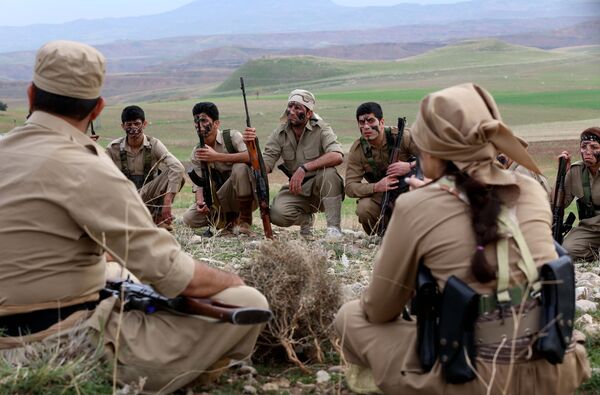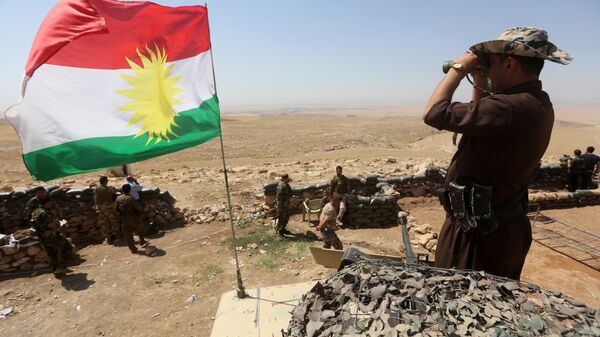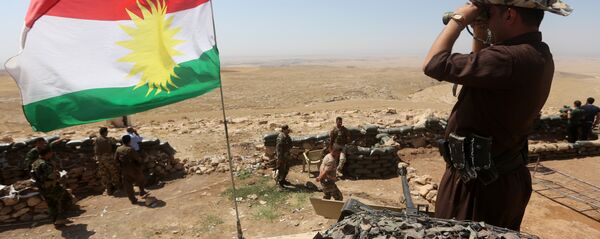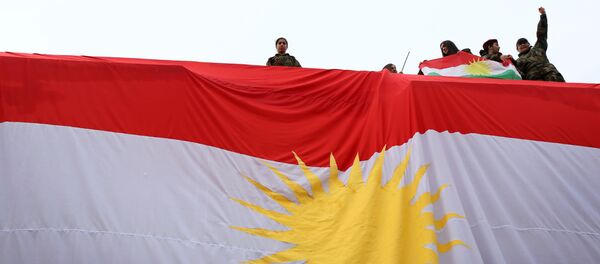According to Mirzayan, the referendum may turn the country into a threat to some players and an important ally to the others.
Earlier in June, President of the Iraqi Kurdistan Region Masoud Barzani announced that on September 25, the autonomous region including the Nineveh, Kirkuk, Saladin and Diyala provinces — claimed by both Iraqi Kurdistan and Iraq — would hold an independence referendum.
For its part, the Iraqi leadership signaled that it will not support any unilateral steps taken by the Kurdistan Region to gain independence. Baghdad refers to the fact that the move would violate the country's constitution.
"Any decision that concerns the future of Iraq must take into consideration the constitutional texts as it is an Iraqi decision… All Iraqis must have their say over the future of their homeland. It is not possible for one party to determine its fate independent of others," Iraqi government spokesman Saad Hadithi said as quoted by the Rudaw news agency.
In his op-ed Mirzayan underscored that the situation is rather tricky: on the one hand, the US invasion of Iraq in 2003 dealt a lethal blow to the country's territorial integrity, making Iraqi Kurdistan a de facto independent entity.
On the other hand, if Iraqi Kurdistan declares independence it will inevitably lead to the defragmentation of Iraq.
Furthermore, it may provoke a domino effect throughout the Middle East: besides Iraq, there are a number of large Kurdish enclaves in Turkey, Iran, and Syria.
"The transformation of the de facto independent Kurdistan [Region] into de jure independent [Iraqi Kurdistan] could trigger a chain reaction that would lead to the collapse of Iraq and would not allow [Baghdad] to preserve the state at least in a federative form," Mirzayan wrote.

"In addition, the Kurds [are planning] to withdraw from Iraq taking not only the territory of the Kurdistan [Region] but also those lands which have been occupied by the Kurdish militia (Peshmerga) during the ongoing war against Daesh… such as oil-rich Kirkuk… and the Yezidi-inhabited Sinjar [also known as Shingal]," the academic emphasized.
Needless to say, Iraqi Kurdistan's neighbors have sounded the alarm regarding the upcoming referendum.
The especially fierce opposition to the independence vote has been recently voiced by the Turks, who consider the planned referendum a "terrible mistake."
Tehran also made it clear that it stands for Iraq's sovereignty and territorial integrity.
"Iran's principal position is to support the territorial integrity of Iraq," Iran's Foreign Ministry spokesperson Bahram Ghasemi said, as quoted by Daily Sabah, "The Kurdistan Region is part of the Republic of Iraq and unilateral decisions outside the national and legal framework, especially the Iraqi constitution… can only lead to new problems."
The academic explained that in that case, Turkey risks breaking the agreement struck by Ankara and Erbil on Iraqi Kurdistan's non-involvement in the Turkish Kurds' rebellion against the Turks.
"Tehran has similar problems," Mirzayan continued, "The conflict with Iraqi Kurdistan might lead to the increase in support to Kurdish militants in Iran on the part of Erbil."
While Tehran, Ankara, Damascus, and Baghdad consider the Kurdish independence movement as a serious challenge to the region's peace and stability, Washington continues to maintain close ties with its Kurdish allies, the academic pointed out.
"The Iraqi Kurds (just like the Syrian Kurds) are viewed by Washington as an American outpost in the region," Mirzayan explained, "Which allows [the US] to influence all countries [of the region]: ambitious Turkey… Iran, Iraq, and different forces in Syria. Independent and pro-American Iraqi Kurdistan is an excellent barrier to contain all regional forces. Therefore, the Americans will support Erbil both with money and guarantees of security."
Mirzayan noted that the Kurds have yet another potential 'friend' in the Middle East called Saudi Arabia.
"Informally, the Saudis have already supported the [planned] referendum," he noted, adding that Riyadh's stance is presently being shared by Egypt and the United Arab Emirates (UAE).
It appears that Barzani has enough allies on his side to push ahead with the independence. Still, according to the academic, the Iraqi Kurdish leadership may reserve a room for maneuver if they decide to remain part of the Iraqi "confederation."
According to Mirzayan, it would have allowed Erbil to preserve good relations with Baghdad and maintain the Kurdish-Iraqi cooperation on very good terms.
As of yet, it seems that Barzani has no intention to bargain ahead of the referendum. However, all parties concerned have enough time to think about the upcoming vote and its potential consequences, Mirzayan concluded.






